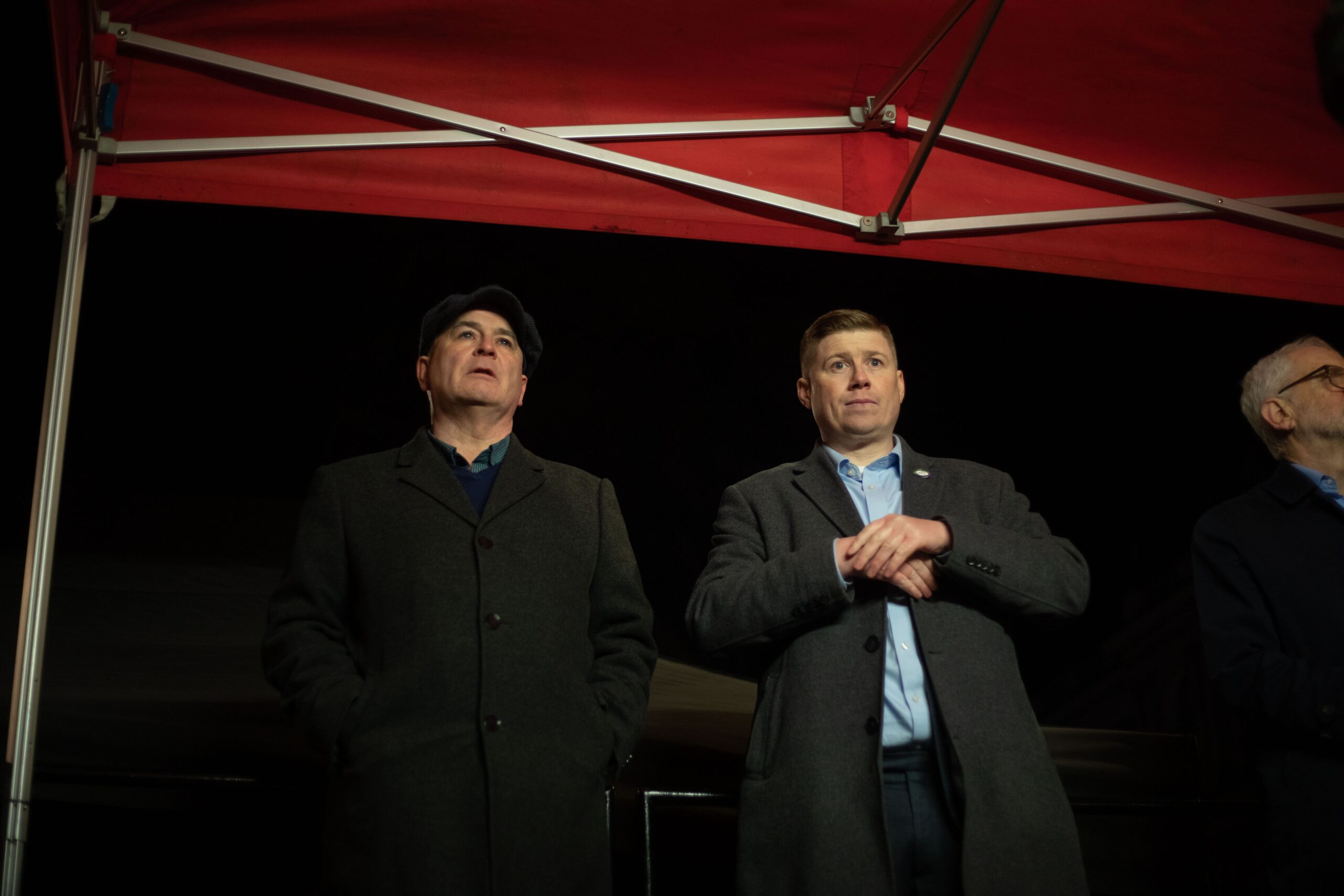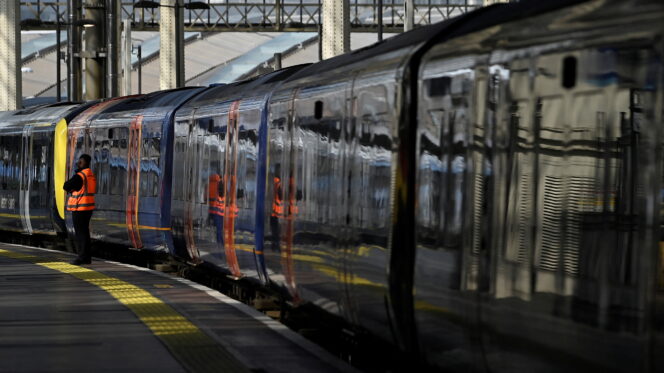Labour Is Renationalising the Railways. Cleaners Are Being Left Behind
‘An apartheid system’.
by Polly Smythe
20 June 2025

Billionaire-backed? Not us. Unlike mainstream media, Novara Media runs on the support of 12,000 people like you, which keeps us editorially independent. Chip in today and help build people-powered media.
Outsourced cleaning workers with poor conditions and bad pay face being left behind as the government renationalises the railways, RMT general secretary Eddie Dempsey has warned.
Dempsey told Novara Media that the “racist” and “exploitative” system of outsourcing is set to continue on Britain’s railways, despite them being renationalised. Dempsey was elected unopposed in March, following the retirement of popular RMT leader Mick Lynch in January.
When the 05.36am South Western Railway (SWR) service pulled out of Woking on 25 May, it did so as the first renationalised train to run under the Labour government. Transport secretary Heidi Alexander said that Labour was “firing this starting gun in that race for a truly 21st-century railway… refocusing away from private profit and towards the public good.”
But despite this “refocusing”, private companies will continue to profit from the railways off the back of outsourced workers – cleaners, security staff, and track and train operatives employed by companies like OCS, Adecco, and Carlisle Support Services.
Workers and union officials say the goal of public ownership is being undermined before the train has left the station. Despite Labour’s pledge to oversee the “biggest wave of insourcing for a generation,” the newly nationalised SWR will continue to outsource essential frontline services.
That means that while train drivers, platform staff and dispatchers will eventually be employed by Great British Railway (GBR), the public body overseeing renationalised rail, the mainly migrant workforce of cleaners, caterers, and security guards won’t. Outsourced workers are the railway’s lowest-paid, often earning little more than minimum wage, lacking sick pay or proper pension provisions.
One railway, a two-tier workforce.
Dempsey told Novara Media that just because workers are outsourced doesn’t mean they’re not the department’s responsibility.
“It is the department for transport now running the railway,” Dempsey said. “They are choosing to employ people on those conditions. They might say they don’t directly employ but they do. They employ them. They just choose to do it via crooks so they can avoid their responsibility to them.”
These “crooks” are often owned by complicated private equity funds or banks, who extract profits by holding down workers’ wages, said Demspey.
“There’s a cleaner who works in Paddington station who, if you ask him what he does for a living, he’ll tell you he’s a banker,” he said. “The irony is, if you follow the food chain, he probably does work for a bank. That’s where it ends up.”
Each year, according to RMT analysis, outsourcing companies take £100m out of the rail industry in profit.
That’s why the transport union has launched a campaign – Better Jobs, Better Services – to push Labour into creating one railway with one workforce. Dempsey said: “This isn’t just a political campaign or a lobbying effort. We’ll get to a point where we make industrial demands on these questions.”
The union will have to push back against a corporate lobbying effort from private companies.
Before last July’s election, outsourcing companies were working hard to cosy up to unions and Labour in order to stem the promised tide of insourcing.
Joining the railways in 2008 as station staff, Dempsey has seen up close what the fragmentation of a railway looks like. When he became active in the union he saw how “we retained strong organisation in some places, but had completely lost it in others.”
The most obvious place was among cleaners. That hadn’t happened overnight: he’d seen how the employer actively created a distance between those directly employed and those subcontracted out.
“They put them in different uniforms, gave them a different mess room, and just made it as clear as day that they were separate and different from the other railway workers around them.”
Dempsey said he has encountered horrific conditions while organising cleaners: workers in debt to payday loan companies, women pressured into giving sexual favours to get shifts, and wages being directed into buffer accounts controlled by managers.
Undocumented workers, who paid gang masters for shifts while using the names of people who’d been sacked, were particularly vulnerable. Paid £4.50 an hour in cash, they’d collect their wages in little brown envelopes out of a railway wagon on a Wednesday night at 11pm.
“It’s basically an apartheid system. It’s a racist system, and it’s an exploitative system,” he said.
A broken promise.
Susie*, who has worked cleaning the railways for close to a decade, agrees. “It’s structural racism. It’s not just two-tier in the sense that we’re on worse terms and conditions than everyone in-house. It’s two-tier in the sense that it’s promoting a structure that is racist.
“Outsourced workers are left to eat in store cupboards, are kept on the sidelines, and aren’t allowed in the same rooms as the in-house staff. You have vulnerable and BAME workers sitting outside looking in, and you have in-house staff with all the facilities that everybody working in that industry should have.”
Having spent close to a decade on the railways, Susie hoped to have worked her way up to another role by now, something that was once common on the railways: the RMT’s assistant general secretary, John Leach, started out as a cleaner on London Underground, before becoming a station supervisor, and then ending up working for the union.
But stories like John’s are no longer possible. Outsourced workers aren’t eligible to make internal applications for jobs on offer to in-housed workers, as they technically work for different companies. “There’s no prospects for you to have a career,” said Dempsey. “You can’t work your way up in the industry.”
When cleaners do apply for in-house jobs, railway cleaner Marcus* said that their shoddy work conditions are then used against them: chronic understaffing and shortages of cleaning equipment means that trains often aren’t cleaned to the satisfaction of the same people responsible for hiring.
“You can have two or three people on holiday, one off sick, and nobody comes and helps you. Management just tells you, ‘try to do what you can.’ And then you tell them, ‘but what about the auditor?’ We barely pass an audit when we have seven staff.”
“They can just increase the workload without any reason. Say you used to clean three stations per day, and all of a sudden they call and say, ‘Now you have to clean five stations per day, and you have to do it to the same standards.’”
All of this results in dirty trains, which then count against cleaners when they apply for in-housed jobs, says Marcus. “You have nowhere to go.”
“The companies that we work for don’t care about training us, because these contractors are not actually based in the industry,” said Susie. “ If we’re not given an opportunity by the company you work for to train and learn and upskill yourselves to actually get in house, you become trapped and stuck.”
That lack of opportunities and entry grade roles entrenches racism. “You’ve only got to look at who’s running the trains and who’s cleaning them,” said Dempsey. It’s a stark difference. I’m sick of hearing about DEI – diversity, equality, and inclusion – from these employers. They fucking drive me mad with it.”
Alexander, who rode the first renationalised departure from London Waterloo, said that “most users of the railway don’t spend much time thinking about who runs the trains – they just want them to work.”
But those who work on the railways certainly do. “When Labour said it would oversee the largest wave of insourcing, they didn’t say: ‘but it won’t include the security staff, the cleaners and the caterers,’” said Susie. “It’s a broken promise, isn’t it?”
A DfT spokesperson said: “Great British Railways will sweep away decades of failure, ending fragmentation and waste and delivering for passengers, taxpayers and staff, and we will continue working with industry to ensure everyone that works on our network is valued and respected.”
*Both drivers chose not to give their real names for fear of retaliation.
Polly Smythe is Novara Media’s labour movement correspondent.


